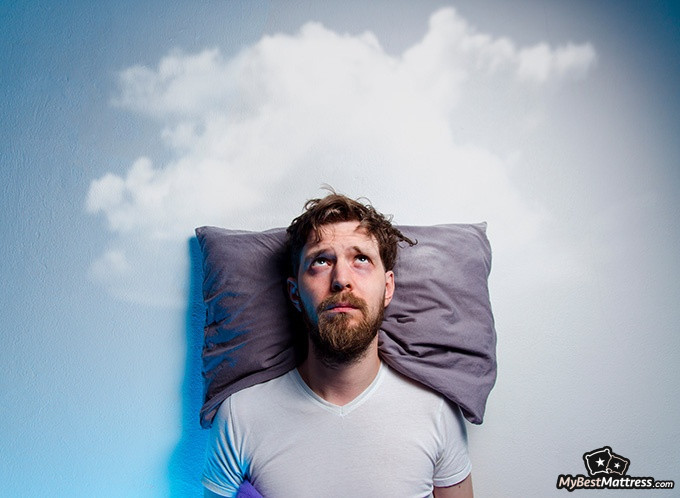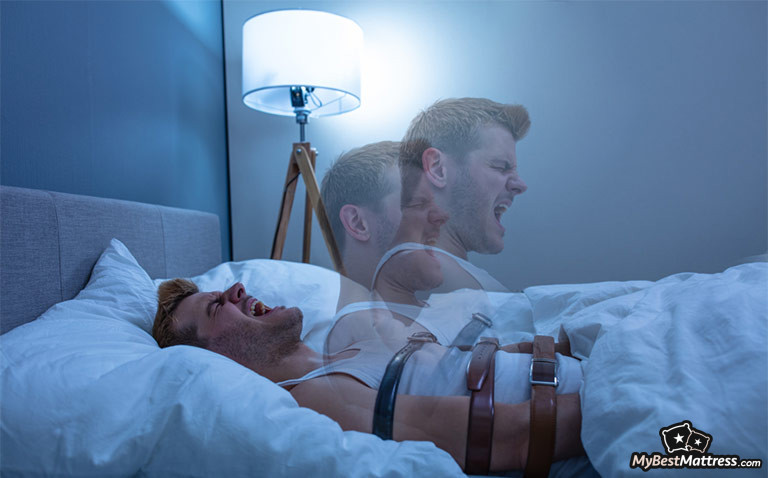
Have you ever had a dream so realistic that you weren’t sure if it had actually happened or not? Sometimes it might be surprising just how lifelike our dreams can be. However, as some people experience such vivid dreams once in a blue moon, it can be a nightly occurrence to others.
As someone who’s experienced vivid dreams - and nightmares - many times, it never ceases to amaze me how some dreams can stick with you for years, if not your entire life. This led me to discover many interesting facts and details about dreams and why some can feel like a hazy memory, while others make it seem like you really performed on stage with Elvis.
But what causes vivid dreams? Why do we dream in the first place? Is it possible to actually master controlling their dreams? And what does it mean if you keep having vivid dreams every night?
Table of Contents
The Science Behind Dreams
Everyone dreams. In fact, we spend around 2 hours of our sleep every night immersed in dreams. But it doesn’t happen randomly. Dreaming is closely linked with the sleep cycle, specifically - Rapid Eye Movement (REM) sleep, when our brains are the most active. Even though we can and do dream all throughout the night, REM sleep leads to the most vivid dreams.
Ironically, dreams formed in this stage of sleep are forgotten the quickest. That’s why vivid dreams are so rare - we simply don’t remember most of them!
That’s one of the reasons why dreams are so intriguing to scientists. But while we have discovered many reasons and benefits of sleep itself, the dream realm remains a mystery to most.
Theories about why we dream can range from denying that there is any reason at all to benefiting dreams to our ability to properly manage our emotions, thoughts, and even stress. That being said, there isn’t a definitive answer just yet.

According to Jennifer Butler, M.D., a sleep medicine physician and pulmonologist, the scientific world is split when it comes to the purpose of dreams, but there are several hypotheses that highlight the most plausible reasons.
- Threat-simulation theory. Have you ever had a dream where you were trying to escape a life or death situation? Well, according to a study[1] conducted by a group of Finnish cognitive neuroscientists and psychologists, dreaming might be a sort of biological “training mode”, where our brain prepares us to survive dangerous situations without the actual threats.
- Activation-synthesis theory. Because, as mentioned previously, dreaming is most likely to occur during the most active stages of our sleep, a theory has been proposed based on this fact. According to an article published by Nature[2], dreaming can be considered our brain's attempt to make sense of the heightened activity levels. This might result in intense emotions, horrifying nightmares, or something completely bizarre.
- Organization of knowledge and memories. One of the most common theories, considered even by Sigmund Freud, the father of modern psychology, is that dreaming is the result of our brains sorting information, emotions, and even solving problems. This hypothesis opens up the possibility of delving deeper into one’s subconscious by analyzing their dreams, and perhaps even using this as a form of therapy.
- Biological response to life circumstances. Another hypothesis tries to explain why some people experience more unpleasant dreams than others. It is speculated that those who live or have lived in more dangerous or unpleasant environments automatically experience nightmares more often than those who weren’t exposed to such circumstances. This supports the theory that our environment influences the content of our dreams.
From what we can see, most theories trying to figure out why we sleep associate the person’s environment with the content of their sleep. Though there are no conclusive answers just yet, we can expect more theories to be presented in the meantime.
Vivid Dreams - How and Why?
Now that we know a little bit more about how and why we dream, let’s delve deeper into what causes vivid dreams and the benefits they might have.
Dreams and their vividity are directly linked to our brain's activity during sleep, specifically REM sleep. But because the chemical balance in our brain is very delicate and can be affected by many internal and external factors, some dreams are inevitably more vivid than others.
For example, such simple things as a change in your daily routine or starting to exercise can unexpectedly give you periods of vivid dreaming while your body adapts to the new conditions. The same goes for emotional and mental triggers. If you suddenly experience very intense emotions or are deeply affected by some sort of incident, your chances of having some interesting dreams notably increase.
As mentioned previously, vivid dreams are closely linked to REM sleep. This is due to the heightened brain activity during these stages of our sleep cycle, resulting in much more life-like visuals, often comparable to actual memories.

In addition, we are usually woken up during one of the last REM stages of the night. This allows us to best remember the last dreams we had, especially if they were more vivid than usual.
But are there any tangible benefits of dreams, vivid and otherwise?
Among the countless studies on sleep deprivation, there are several focusing on dream deprivation.
During these experiments, it was found that subjects deprived only of REM sleep and in turn not allowed to dream as much and as vividly, experienced weight gain, increased irritability, difficulty concentrating, and anxiety.
These studies provide strong evidence that supports our need for a complete sleep cycle, but only indirectly show the benefits of being able to dream.
At the moment, if we were to focus specifically on dreams and the perks of having them, we would need to go back to the several theories as to why we dream.
That being said, we could drift to the more esoteric side and look more into dreams as a gateway into our deepest thoughts and desires.

Dream interpretation has been around for much longer than you might think and can be traced back to Mesopotamia in 3100 BC. Throughout history dreams have been seen as a powerful form of divination, especially focusing on vivid dreams, as they were thought to be prophetic.
Since then dream interpretation has been a point of interest in several fields. Though you can still find dream dictionaries with meanings assigned to almost every imaginable scenario, more and more people have been looking into dream interpretation as a form of psychotherapy.
A paper[3] published in 2009 revealed that most people believe that their dreams reveal meaningful hidden truths. This can be linked to Sigmund Freud’s theory[4] that dreams are “the royal road” to the unconscious and that dreams can be used to tap into the unconscious and treat psychological problems.

So, to put it shortly, vivid dreams have as many benefits and meanings as you believe them to have, so don’t be afraid of looking up what flying on a pink panda in your dreams might symbolize. You might just learn something new about yourself!
How You Can Get More Vivid Dreams
Whether you’re someone who might want to experience something psychedelic or prophetic in your dreams or would simply want to remember what you’ve dreamt for once, knowing what causes vivid dreams can help you have them more often.
As I’ve already mentioned, many theories link what we experience in the waking world to what we see once asleep. Following that logic, there should be some way to encourage vivid dreaming. Well, it’s your lucky day, because here is how to have vivid dreams almost every night.
- Setting intention. Believe it or not, but one of the easiest ways to vivid dreaming is simply wanting to have them. Vivid dreams occurring in the REM stages of sleep are often forgotten within the first 5-10 min of being awake, making it seem like you don’t even get them. According to a meta-study[5] from 2007, deciding and expecting to have and remember your dreams is a simple trick to raise your chances of recalling your nighttime adventures.
- Keep a dream journal. As cliche as it sounds, this one actually works! No wonder it is one of the first suggestions people receive if they want to have vivid dreams. Dream journals have been proven[6] to work best if the dreams are written down immediately after waking up. This not only makes it easier to recall the crazy details but helps you train your mind to hold on to the memories for long after waking up.

- This might come as a pleasant surprise to some and a disappointing shock to others, but playing video games has been linked to having more vivid, and even lucid dreams (more on that later). Believe it or not, but the effect video games have on the vividness of our dreams has been a subject of scientific research for over a decade. It is speculated that this is due to the gamers being used to navigating and being alert in various fantasy scenarios, making them more likely to have and clearly remember their vivid dreams.
- If you are interested in a lower effort way of attracting vivid dreams, I have great news for you, because there’s a simple and even pleasant trick you can use to influence your nightly visits to dreamland. Many studies[7] have shown that there are simple ways to directly influence the content of our dreams - while we are dreaming them! One of the ways is by using various smells. Fill your room with flowers or sweets for pleasant dreams, or, if you’re looking for something with a bit more kick, try more pungent or spicy odors. Or you can always experiment and find the perfect psychedelic concoction.
- Have you ever heard about reverse psychology? Well, turns out you can use it on your subconscious mind to invoke some very specific and vivid dreams. A 2013 study[8] showed that suppressing certain thoughts can encourage the sleeping brain to bring them up as very vivid dreams. This can be quite useful if you are looking to live out specific scenarios in your dreams, however, this should be kept in mind if you are someone who experiences intrusive thoughts and are worried you might see something you want to avoid.

- Of course, there are more natural (and perfectly legal) approaches available. Most commonly known as the “dream herb”, Calea Zacatechichi has been used by Chontal Indians of Mexico as a slight hallucinogenic for various rituals and ceremonies. Though still heavily associated with Native American cultures, the plant is currently less mystified and commonly available in tea form. If you can’t find Calea in your local supermarket, you can always go for mugwort, often credited for its ability to not only promote vivid dreams but increase your chances of controlling them as well.
- If all else fails but you’re still longing for some intensely vivid dreams, you can always go the less natural route. Because, as mentioned previously, our brain's chemical balance is incredibly delicate, certain over-the-counter medications can throw it out of whack, resulting in some interesting dreams. One such infamous drug is the seemingly harmless NyQuil with a common side effect of almost hallucination-like dreams. In addition, nicotine patches and most commonly prescribed drugs for mental and emotional disorders are also blamed for unexpected nighttime adventures. So be careful with what you take before bed because you might just be in for a time of your life, whether you want it or not.
- And finally, if you are looking for the most harmless way to boost dreams with the smallest chance of it backfiring, you should always make sure your sleep environment is up to par. To assure you cycle through all sleep phases during the night you should be able to sleep soundly through the night without waking up. To assure the highest quality of sleep your room should be comfortably cool, dark, and your bed should be as comfortable as a cloud. If you suspect your old bed is stopping you from having vivid dreams it might be time to invest in a new high-quality mattress.

As you can see, there are many tips and tricks you can implement to take your dreaming experience to some unexpected levels. Keep in mind, however, that all of these tips and their effectiveness can vary from person to person. So don’t be discouraged and keep searching for the best option for you, because your sleeping mind’s capabilities might just surprise you.
Lucid Dreaming - Fact or Fiction?
While some might be looking for ways to be able to simply remember or have more vivid dreams, others have ventured outside of the simple bounds of immersing into a land of wonder.
Lucid dreaming - the awareness of being in a dream and even the ability to control the situations - is as vivid as any dream can come. This phenomenon has been known to us since as early as 415 AD. Practicing what was then called “dream Yoga” was especially common among early Buddhists and ancient Indian Hindus.
Don’t worry, this doesn’t mean you have to sleep in the downward dog pose to achieve dream lucidity.
Knowing how to have such vivid dreams to the point of being aware of them has since become a white whale to many, with some sharing their incredible accounts and others craving to have that experience themselves. That being said, however, lucid dreaming is much more real than the elusive Moby Dick.

The term itself, coined in 1913 by a Dutch psychiatrist and writer Frederik van Eeden, is often interpreted in various ways, however, the main point stands firm. Lucid dreaming, before anything else, means you are aware that you are in your dreams.
Alright, it’s time for some science.
First and foremost, the main and most easily observable difference between lucid and non-lucid dreams is, in fact, neurophysiological. While we are having regular, non-lucid dreams in REM sleep, activity in the dorsolateral prefrontal cortex decreases significantly. In contrast, during lucid dreams brain activity in the cortex increases so much that it can be comparable to that of when one is awake.
This led some researchers to link lucid dreaming with the phenomenon of false awakening - such vivid dreams of waking up that they seem completely real. It was later found that false awakenings are often the sign of beginning to lucid dream, with the dreamer beginning to question whether they are actually awake or not.
So, if you are ever confused why your morning omelet is talking to you, you might just be lucid dreaming!

Similarly to regular, non-lucid dreams, being aware that you're dreaming can have some significant benefits. In fact, they might even be greater than those of simple vivid dreams.
First and foremost the ability to control your dreams can be used as a form of therapy. Whether you’re having trouble with nightmares, past trauma, or insecurities, lucid dream therapy is definitely worth your consideration.
Being able to safely and easily work with yourself in an environment controlled by you can offer a sense of security, comfort, and confidence, which makes the thought of overcoming certain hurdles much less daunting than doing exercises in a therapist’s office.
Lucid dream therapy can be especially useful for those suffering from Post Traumatic Stress Disorder (PTSD), as being able to control the situation is one of the most important factors in successful healing.
It is important to note, however, that lucid dream therapy should be paired with working with a professional for maximum effectiveness and staying on the best path for you.

Of course, you don’t need to have psychological trouble to try out or benefit from lucid dreaming.
Another use for lucid dreaming is exploring new creative possibilities. According to Deirdre Barrett, people can gain enough control over their dreams to use the limitless capabilities of their minds to search for art inspiration and even run trials of various work-related problem solutions.
That being said, it would take a lot of time to reach such a high level of dream control.
If you are interested in learning how to lucid dream there are some tested methods that can open you to a whole new realm of possibilities.
- Out of all the techniques you can use to learn to lucid dream, this one is recommended the most. Reality checking is reported to give some of the best results compared to any other trick. In addition, it is an incredibly low-effort method that anyone can try out. The key is to periodically check your reality while awake, such as taking notice of your surroundings, the way you feel and interact with them, and even simply asking yourself “am I awake? Am I dreaming?” This helps your brain notice the nuances of being awake and later recall them while dreaming. The only trick is to actually remember to do it while awake. Some common and simple reality checks include looking at constant objects (such as mirrors or your hands) and periodically making sure the world is working “normally”, as regular physics doesn't apply in dreams.

- Though not as pleasant to some, a simple way of tricking your brain into quickly entering REM sleep is the Wake Back to Bed method. There are several variations of WBTB, but one of the easier options includes setting an alarm to wake up around 5 hours after your bedtime. Once the alarm goes off, stay awake for around 30 minutes. The key factor in choosing an activity that requires full alertness, such as reading. Once the half-hour is up, go back to sleep. This technique can significantly increase your chances of having lucid dreams after going back to bed.
- If you are looking for a science-backed method to try out, you might want to consider the mnemonic induction of lucid dreams. Don’t worry, the name sounds much more complicated than the technique actually is. For this to work best, you will need a memory of a recent dream. Now, if you don’t remember any of your own dreams, store-bought is fine… Just kidding, but if you really can’t remember any recent dream, thinking about any common dream scenario, such as flying, should work as well. This will be your dreamsign. Right before falling asleep, tell yourself that you will have a dream with said dreamsign and that you will be aware of it being a dream. This technique is based on prospective memory and was first researched in 1980 by the pioneer of lucid dream research, psychophysiologist Dr. Stephen LaBerge himself.
There are many more tricks available out there that promise you the ability to control your dreams after one attempt, however, these three techniques are thought to be the most effective. In fact, according to a 2017 study, combining and using these methods together is the best way to gain control of your vivid dreams.
Of course, you can choose to only focus on learning to lucid dream, but encouraging more vivid dreams can help you gain control of your sleeping mind much quicker and easier.
The Possible Messages In Your Dreams
Alright. I've already discussed how to have vivid dreams every night, but what does it mean when you don't even need to try?
We already know that vivid dreams are often seen as carrying significant meaning and sometimes even prophetic. And while there are many sources with various levels of credibility, there is no harm in finding out what the most common dreams might mean.

Who knows, maybe your subconscious mind has been sending you messages about your future for years!
- Everyone has had a dream where they were falling seemingly without end. This common dream scenario is said to signify something in your life that isn’t going as well as it could, and that it is up to you to figure out what you can do to change that.
- Ever walked into a room full of people completely naked only to wake up in a cold sweat in your bed? Well, it might mean that you feel like you're pretending to be someone you're not, resulting in subconscious fear of revealing your true self to others.
- Perhaps one of the more cringe-inducing dreams is losing your teeth, either from injury or them simply falling out of your mouth. This can be a subconscious signal that you feel out of control and powerless in a situation, which needs to be addressed before any more issues arise.
- Another common recurring dream is that of being chased. In this case, the supposed meaning of these scenarios depends on who - or what - is coming after you. If it is someone of the opposite sex it might indicate a fear of love or past relationship issues. An unidentified or monstrous pursuer points to a possible childhood experience or trauma. And if you’re trying to escape from an animal, you might actually be running from your own anger or passion. Deep, right?
There are many sources readily available to those looking to learn more about their dreams and themselves, from old paperback books in libraries to dream interpretation apps. Whichever path you choose, however, it should be kept in mind that none of these interpretations are set in stone.

That being said, if your gut instinct is telling you to pay more attention to your dreams and their meanings, maybe there really is more to those president tea parties than what meets the eye.
Conclusions
From pleasant fairytale-like scenarios you wish weren’t interrupted by your alarm clock to terrifying nightmares that can leave you too scared to open your eyes in the morning, vivid dreams can leave a lasting effect on anyone.
Though we don’t definitively know why we dream, existing theories all see dreaming as something our brains need in order to properly function while we’re awake. From problem-solving skills to lower stress levels, dreams actually play an important role in our daily lives.
Along with the scientific world, vivid dreams and their meanings have been intriguing spiritualists for centuries. So whether you’re more into scientific proof or divination and dream interpretation, it’s always interesting to learn more about our nightly adventures.
If you would like to have more vivid dreams there are plenty of methods out there for you to try out, from herbal teas to meditation and everything in between. However, nothing can beat a good night’s rest, as deep, high-quality sleep in a comfortable bed is the most surefire way of encouraging vivid dreams.
I hope you found this article interesting and perhaps this sparked a curiosity in you to learn more about what your brain is up to when you close your eyes for the night.
Good luck and sweet dreams!
Scientific References
1. KATJA VALLI and ANTTI REVONSUO 'The threat simulation theory in light of recent empirical evidence: A review'
2. Hobson, J. 'REM sleep and dreaming: towards a theory of protoconsciousness'
3. Morewedge, C. K., & Norton, M. I. 'When dreaming is believing: The (motivated) interpretation of dreams.'
4. Freud, S. .The interpretation of dreams.'
5. Beaulieu-Prévost D, Zadra A. 'Absorption, psychological boundaries and attitude towards dreams as correlates of dream recall: two decades of research seen through a meta-analysis.'
6. Aspy DJ. 'Is dream recall underestimated by retrospective measures and enhanced by keeping a logbook? An empirical investigation.'
7. Yu, C. K. 'The effect of sleep position on dream experiences.'
8. Kröner-Borowik T, Gosch S, Hansen K, et al. 'The effects of suppressing intrusive thoughts on dream content, dream distress and psychological parameters.'
Leave your honest feedback
Leave your genuine opinion & help thousands of people to choose the best mattress. All feedback, either positive or negative, are accepted as long as they’re honest. We do not publish biased feedback or spam. So if you want to share your experience, opinion or give advice - the scene is yours!













